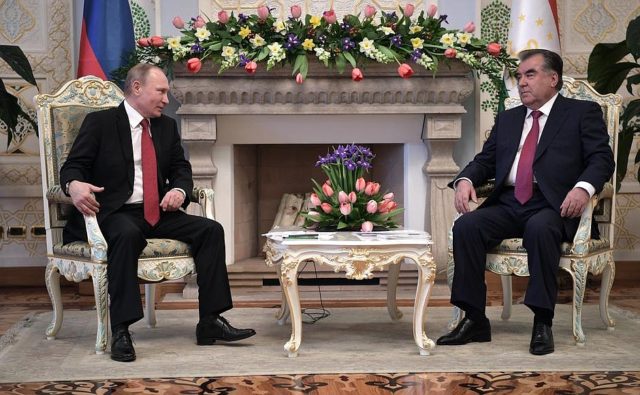
Russian Anxiety About Central Asia Becomes Palpable
Publication: Eurasia Daily Monitor Volume: 14 Issue: 39
By:

Moscow’s anxieties about Central Asia and its position there are becoming increasingly visible. And renewed charges of Russian imperial ambitions in the region and elsewhere clearly sting the Kremlin. Thus, Foreign Minister Sergei Lavrov felt obliged to denounce “allegations” about his country’s imperial ambitions, claiming, “Russia has always respected the choice made by the people of the former Soviet Union who decided to be independent and develop their own countries.” Lavrov insisted that, particularly in Central Asia, Russia has steadily cooperated on both a bilateral and multilateral basis with local governments (TASS, March 15).
Lavrov’s remarks came on the heels of President Vladimir Putin’s recent tour of Central Asia (February 27–28), aimed at shoring up Russia’s military and overall regional presence. The visit may have in part been motivated by the continuing drumbeat of international reporting that Moscow is promoting and supporting the Taliban, even as it promises to safeguard Central Asia against terrorist threats (see EDM, February 1). But there was no real sign of Putin’s willingness to ease the Central Asians’ economic dependence on remittances from migrant workers in Russia or to address other forms of economic distress. Indeed, it is unlikely that Moscow can afford to do so. So despite the ramping up of Moscow’s military presence in Central Asia, Putin, for example, failed to resolve any economic issues with Tajikistan—not least negotiations on the country’s admission to the Eurasian Economic Union (EEU)—during his visit there. Instead he evidently reaffirmed that Russia’s 201st division military base, hosted by Tajikistan, would resume patrolling the small Central Asian republic’s border with Afghanistan. Tajikistani forces have allegedly been ineffective at this task (Sputnik News, February 27; News.tj, February 28; Iranian Radio External Service, March 1).
On his final leg of the trip, in Kyrgyzstan, Putin stated that Russian forces would consider withdrawing from their base at Kant, if the local government announces that it has sufficiently strengthened its own security situation (Kremlin.ru, February 28). Clearly, such an outcome is not likely anytime soon. Instead, the Kremlin’s rhetoric appears to be signaling an increased emphasis on a military approach toward security in Central Asia (Gazeta.ru, February 28). This shift in degree is probably motivated most of all by the deteriorating situation in Afghanistan, a perceived need to respond to widespread foreign accounts of Moscow’s support for the Taliban (Japan Times, March 8), and possibly by growing reports of Chinese military presence in Afghanistan (see EDM, November 17, 2016; 1tvnews.af, February 24, 2017; Reuters, March 1). As Lavrov maintained in a March 15 interview with Mezhdunarodnaya Zhizn magazine, one cannot overestimate the role played by Russian forces and the Collective Security Treaty Organization (CSTO—a military alliance of post-Soviet republics, headed by Russia) in protecting the region from all the threats associated with the Islamic State.
It also is clear that Moscow wants to ensure that Kyrgyzstan remains inside the EEU after its presidential election later this year. And as a recent Russian press commentary points out, if instability comes to afflict any or all of the Central Asian states, economic development would become highly problematic (Rossiyskaya Gazeta, March 4). This kind of reasoning, thus, also perpetuates Russia’s growing emphasis on hard security for the region. The military sphere, after all, is supposed to be Moscow’s comparative advantage in Central Asia.
Russia’s support for the Taliban against the Islamic State is likely motivated by the fear that the latter militant group might win and supposedly be even more of a threat to Afghanistan’s neighbors than the Taliban. But in addition, Moscow apparently feels it cannot afford to fight a fourth war on top of its military operations in Ukraine, the North Caucasus and Syria; in the current fiscal environment, a huge defense buildup program to fund an Afghan intervention is out of the question. Obviously Russian leaders understand the risks of a war in Afghanistan or Central Asia, and they also presumably know full well that Russian society would be loath to support such a protracted conflict, given the memories of the Soviet war in Afghanistan (1979–1989). Therefore, there is good reason to suspect that for all the talk and overt signaling about Moscow’s readiness to provide hard security in Central Asia, Russia is quite reluctant to have to cash this check should it come due (Rossiyskaya Gazeta, March 4).
Russia’s maneuverings, along with those of China and the United States, which is apparently about to send more forces to Afghanistan, appear to confirm external observers’ continuing need to characterize the great powers’ policies in Central Asia as a new manifestation of the Great Game and as inherently destabilizing (Iranian Radio External Service, March 9). While this view may have some merit, it also is the case that—as the September 11, 2001 attacks proved—what happens in Central Asia does not stay in Central Asia. At the same time, Afghanistan, if not Central Asia more broadly, has long had the reputation of a place where empires go to die. As the 19th century Russian Foreign Minister Alexander Gorchakov (1856–1882) sagely observed, “the difficulty lies in knowing where to stop.” But it is not clear whether today’s Russia knows where to stop, for it is repeatedly caught in situations of having to prove to itself and other audiences its imperial bona fides in the region. Here it might also be worthwhile to remember the observation of Gorchakov’s colleague, Interior Minister Pyotr Valuev (1861–1868), that there is “something erotic” (nechto eroticheskoe) about Russia’s imperial ambitions. And that makes it even more difficult than Gorchakov probably imagined for Russia to resist over-involvement in Central Asian and in taking on too many insupportable imperial burdens.



